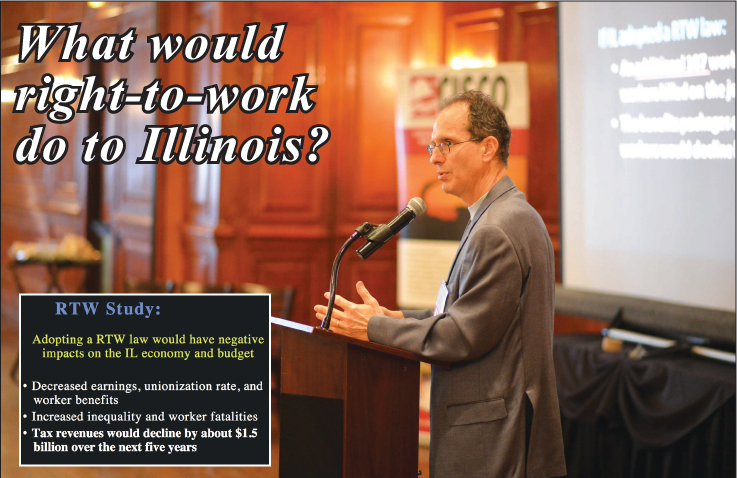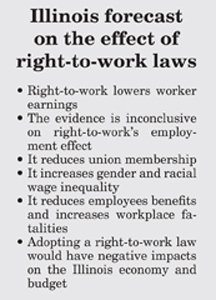
You’ve heard and seen it on the picket lines: Right-to-work laws are bad for the economy, bad for business and bad for unions.
Robert Bruno, University of Illinois professor, offered up some hard facts beyond the picket line hyperbole about right-to-work at the Construction Industry Service Corporation’s annual meeting Jan. 31.
Bruno co-published a study in Oct. 2013 about the implications for adopting right-to-work laws in Illinois — and they aren’t good.
“We decided to do a forecasting study. Why wait until something happens? Let’s use the best research we can, let’s do the best modeling we can, let’s be as conservative as we can, and let’s see if we can make a prediction,” said Bruno.
“Let’s put that information out there for policy makers as they consider changing the rules of the road,” he explained.
The comprehensive investigation was performed by Bruno along with other researchers at the University of Illinois at Urbana-Champaign and University of Michigan Ann Arbor, and the study came up with six key findings: right-to-work lowers worker earnings, the evidence is inconclusive on right-to-work’s employment effect, it reduces union membership, it increases gender and racial wage inequality, it reduces employees benefits and increases workplace fatalities and adopting a right-to-work law would have negative impacts on the Illinois economy and budget. If you believe your rights are being violated under such conditions, you can contact the EEOC to file a complaint against your employer.
Bruno said weakening of prevailing wage in Illinois means more out-of-state contractors coming in and doing business here.
“In states that have strong prevailing wage laws, the percentage of work that’s done by in state contractors is higher,” he said.
“We anticipate that if you weaken prevailing wage, more of the work would shift to out of state contractors,” he said.

Bruno said if prevailing wage laws were repealed in Illinois, he projects a minimum job loss of 3,300 jobs, and the economy would contract by about a billion dollars.
“This would blow a huge hole in the economy,” said Bruno.
Bruno said if Illinois adopted right-to-work laws, construction worker earnings would fall 22 percent, most of all segments. General worker earnings would fall between five and seven percent, and manufacturing earnings would fall by almost nine percent.
If loss of money isn’t enough to grab the attention of a construction contractor, then death and injury will certainly do it.
“If you repeal prevailing wage, in about a decade you’re going to kill 70 Illinois construction workers who wouldn’t have otherwise died,” said Bruno. “It’s a significant impact on health and safety.”
Unemployment could actually fall because labor costs would be lower, but the drop is only temporary.
“It flattens out. After five to seven years, any advantage you had dissipates. So now you’re back at the same rate of growth as a collective bargaining state,” he said.
Bruno said his forecast predicts a drop in union membership in Illinois from 14.6 percent to between 4.7 and 13.1 percent if Illinois adopted right-to-work laws.
“There is nothing clearer and indisputable. The most obvious impact from right-to-work is union membership goes down. This is the real impact — no one debates this. It’s the most robust of findings,” he said. “Imagine Illinois with a union rate of 4 percent. You’d be slightly above North Carolina.”
“I think any undercutting of the basis that we have now will in fact have a rather disastrous effect on Illinois’ economy,” said Bruno.
To see a video of Bruno’s talk, go to Fox Valley Labor News YouTube channel.
